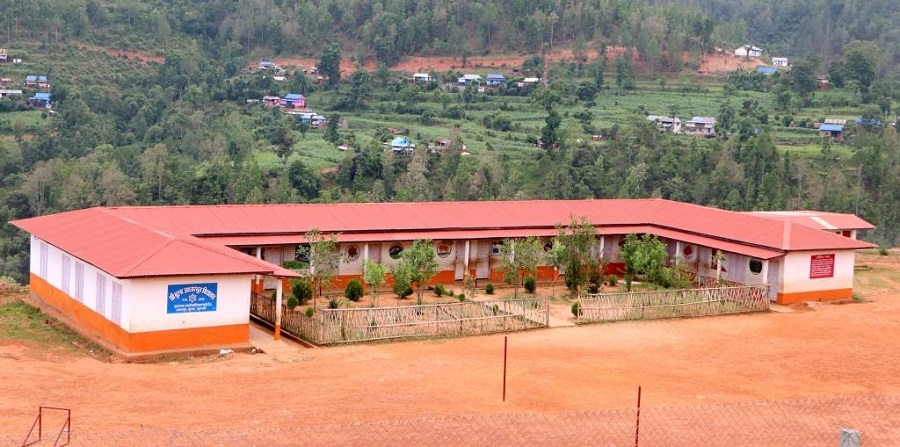
In the villages of western Gulmi, well-structured schools are being built at a rapid pace. So far, 20 schools have been established across seven local municipalities. These schools share a uniform structure, color, and educational approach.
UWS Nepal has been working in the field of educational development in the district since 2074 B.S. This non-governmental organization collaborates with seven local units in the district, focusing on quality education through partnerships with local governments and communities.
Operational Areas and Early Beginnings
UWS Nepal has implemented its programs in Resunga Municipality, Musikot Municipality, Dhurkot Rural Municipality, Madane Rural Municipality, Malika Rural Municipality, and Isma Rural Municipality.
Currently, it is constructing school buildings and toilets in Rurukshetra Rural Municipality of Constituency No. 1.
The organization initially began its operations in 2074 from Shree Rampokhari Primary School, Dhurkot Rural Municipality–7, Bagla.
Agreement for School Transfer After Five Years
According to an agreement, the schools constructed under the program are to be handed over to local authorities after five years.
Following this agreement, UWS Nepal has already transferred schools such as Pashupati Lower Secondary School, Saunethum Basic School, Panchamipokhari Primary School, Siddha Primary School, Devisthan Primary School, and Rampokhari Primary School to the community and local governments. Similarly, Palukha Secondary School and Bararukh Basic School are also scheduled for handover.
Schools Constructed with Buildings and Toilets
UWS Nepal has built 20 schools along with sanitation facilities in seven municipalities. In Resunga Municipality–6, Saunethum Basic School was constructed, while in Musikot–4 Wardagaun, Pashupati Lower Secondary School, and in Ward No. 8, Wami Maidan, the building of Malarani Primary School was completed.
In Isma Rural Municipality–6, Bulma Primary School, in Ward No. 2, Palukha Secondary School, and in Ward No. 3, Suntaladevi Basic School have been constructed. Similarly, in Malika Rural Municipality–2, Chyandanda Secondary School and Siddha Malika Basic School were constructed, along with Siddha Primary School in Ward No. 5, Thulichaur Basic School in Ward No. 4, Siddheshwari Primary School in Ward No. 8, Bararukh Basic School in Ward No. 7, and Ranipokhari Basic School in Ward No. 6. This information was provided by Meghraj Khanal, Construction Officer at UWS Nepal.
Programs to Promote Quality Education in Remote Areas
In Madane Rural Municipality–1, Balbikash Primary School, Panchami Pokhari Primary School in Ward No. 2, Khanyukharka Basic School in Ward No. 3, and in Dhurkot Rural Municipality–3, Janjyoti Basic School were constructed.
Additionally, Devisthan Primary School in Ward No. 4 and Himalaya Secondary School in Ward No. 5 have been supported with programs to promote quality education.
According to Khanal, schools are constructed with 5 to 11 classrooms based on need, supporting the delivery of educational programs. Construction of toilets and sports materials is also managed by the organization’s own skilled workers.
Infrastructure development is carried out through a tripartite partnership involving the school, the local community, and local government.
New Construction Underway in Rurukshetra
At present, a school is under construction in Botegaun of Rurukshetra Rural Municipality. UWS Nepal’s primary goal is to motivate students to learn, read, write, count, and dream.
The organization extends its support to geographically remote, economically disadvantaged, and marginalized communities.
Classification Based on Environment and Learning Outcomes
According to UWS Nepal’s Education Coordinator Anuj Prasad Sigdel, schools are classified based on environmental conditions, attendance of teachers and students, classroom management, learning activities, and teaching quality.
The organization also implements a child protection code of conduct, inclusive education policies, professional development training, classroom monitoring, and child-friendly learning environments.
Targeting Zero Educational Poverty by 2030
From 2025 onwards, UWS Nepal is set to launch quality education programs in seven schools of Malika Rural Municipality and ten schools of Isma Rural Municipality under the Zero Educational Poverty Program, in partnership with local governments. National Director of UWS Nepal, Abhinash Jha, shared this plan.
Jha also stated that the organization aims to ensure quality education and declare two municipalities as “zero educational poverty zones” by 2030. He added that planning is underway to expand the program to other municipalities within the district.
Praise for UWS Nepal’s Collaborative Approach
Chairperson of Rurukshetra Rural Municipality, Yadu Gyawali, praised UWS Nepal's educational model, stating that it prompted the local government to begin working in collaboration.
He acknowledged the organization’s commendable efforts in timely infrastructure development, government and community partnership, and improvement of educational quality.


